|
|
|
Sort Order |
|
|
|
Items / Page
|
|
|
|
|
|
|
| Srl | Item |
| 1 |
ID:
178879
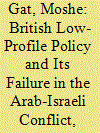

|
|
|
|
|
| Summary/Abstract |
Following the Suez Campaign in October 1956, Great Britain began to step away from the Middle East. Its policy aimed at a gradual withdrawal from the region while protecting its interests, ensuring the uninterrupted supply of oil, and curbing Soviet expansion. Hence the policy of the United Kingdom (UK) was to maintain stability as another war between Israel and its Arab neighbors would be detrimental to its economy and provide the Soviet Union with the opportunity to deepen its incursion into the region. Britain therefore adopted a low-profile policy, designed to avoid taking sides in the Arab-Israeli conflict. In practice, it was burying its head in the sand. The Arabs viewed the absence of clear support for them, particularly in the issue of water, as implicit support for Israel, especially since Britain was secretly supplying the latter with weapons. London’s low-profile policy did not stand the test of regional developments. The tension between Israel and Egypt that emerged in mid-May 1967, intensified over the closing of the Straits of Tiran by Egypt, led the UK to take steps to ensure free passage through them.
|
|
|
|
|
|
|
|
|
|
|
|
|
|
|
|
| 2 |
ID:
151227
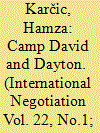

|
|
|
|
|
| Summary/Abstract |
U.S. mediation towards resolving the Arab-Israeli conflict in the 1970s and Balkan conflicts in the 1990s may not seem comparable at first. Differences between these conflicts in terms of history, duration and dynamics abound. The nature and level of U.S. involvement provides further contrasts. Yet, the Camp David negotiations in 1978 and the Dayton Peace Talks in 1995 offer striking parallels in terms of third-party mediator actions undertaken. This article compares the two summits by applying the analytic framework developed by Curran, Sebenius and Watkins to categorize third party mediator strategies. The analysis builds on this framework and deduces common tactics employed by third-party mediators at Camp David and Dayton.
|
|
|
|
|
|
|
|
|
|
|
|
|
|
|
|
| 3 |
ID:
158989
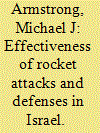

|
|
|
|
|
| Summary/Abstract |
This empirical article studies rocket attacks and defenses in Israel during operations Protective Edge, Pillar of Defense, and Cast Lead, and also during the Second Lebanon War. It analyzes publicly available counts of rockets fired, fatalities, casualties, and property damage. The estimates suggest that interceptor deployment and civil defense improvements both reduced Israel's losses slightly during Pillar of Defense and substantially during Protective Edge. They also imply that interceptor performance during Pillar of Defense may have been overstated. Ground offensives were the most expensive way to prevent rocket casualties. Interceptors were at least as cost-effective as military offensives, and their advantage improved over time. Without its countermeasures, Israel's rocket casualties could have been more than fifty times higher during Operation Protective Edge. These results imply that Israel's rocket concerns were more justified than critics admit, but its military operations were less worthwhile than intended.
|
|
|
|
|
|
|
|
|
|
|
|
|
|
|
|
| 4 |
ID:
193231
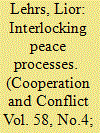

|
|
|
|
|
| Summary/Abstract |
What is the dialectical influence between interlocking peace processes? The scholarship in the field of conflict analysis has identified the occurrence of “interlocking conflicts”—namely, linked conflicts that affect each other—but less attention has been drawn to the linkages between efforts to resolve them. The article focuses on the phenomenon of “interlocking peace processes,” in which parallel peacemaking efforts take place among interlinked conflicts. This article examines how progress in one peace process can influence an interlocking process, and the conditions under which a breakthrough in one process can trigger progress in a parallel process or undermine its advancement. It offers a theoretical framework for the analysis of interlocking peace processes, outlining three main arguments, which rest on three influence patterns: complementing peace processes, competing peace processes, and a paving-the-way peace process. The discussion considers how the mechanisms of diffusion, identity formation, and legitimization serve as dominant tools in these processes. The article uses the interlocking peace processes in the Arab-Israeli conflict as a case study, examining the relationship between four processes in the Middle East: the Israeli- Egyptian, Israeli-Palestinian, Israeli-Jordanian, and Israeli-Syrian peace processes.
|
|
|
|
|
|
|
|
|
|
|
|
|
|
|
|
| 5 |
ID:
142178
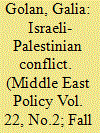

|
|
|
|
|
| Summary/Abstract |
The Arab-Israeli conflict has defied numerous attempts at resolution, placing it in the category of intractable conflict. Yet even a conflict as intractable as this can be transformed, and breakthroughs toward peace can occur. Indeed, this has happened between Israel and Egypt, Jordan, and even the Palestinians — in the form of the Oslo Accords. Looking at the Israeli side of the conflict, numerous factors lay behind these breakthroughs, while their absence or the addition of other circumstances or factors accounted for the numerous failures.1 An understanding of some of these factors may provide insight not only into the pitfalls that await future efforts at resolution, but also into possible remedies.
|
|
|
|
|
|
|
|
|
|
|
|
|
|
|
|
| 6 |
ID:
172911
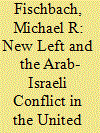

|
|
|
|
|
| Summary/Abstract |
The youthful activists who made up the New Left during the 1960s were largely in accord in their opposition to the Vietnam War and their support for the black freedom movement. By contrast, they were deeply divided about how to approach the Arab-Israeli conflict. Some left-wing youth championed the Palestinian cause as another example of support for anti-imperialist struggles in the Third World. Malcolm X, the Black Panther Party (BPP), and famous Youth International Party (Yippie) figures Abbie Hoffman and Jerry Rubin felt this way, as did certain members of Students for a Democratic Society (SDS). Other members of the New Left balked at calling Israel an imperialist oppressor and pushed back, including some in SDS, but also groups like the Radical Zionist Alliance. The result was bitter conflict and invective that was worsened by the fact that left-wing Jews, who were present in disproportionately large numbers in the New Left, were represented on both sides of this issue.
|
|
|
|
|
|
|
|
|
|
|
|
|
|
|
|
| 7 |
ID:
179485
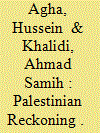

|
|
|
|
|
| Summary/Abstract |
The o!cial Arab-Israeli con"ict has ended. Over the past several months, Bahrain, the United Arab Emirates (UAE), Sudan, and Morocco have normalized relations with Israel.
Oman may be on its way to doing so, and Saudi Arabia has taken
unprecedented steps in that direction. Other Arab governments maintain important, albeit discreet, ties with Israel, and further moves toward normalization appear to be only a matter oftime. Egypt and
Jordan have been at peace with Israel for decades.
The one-time pan-Arab call for a united front a
|
|
|
|
|
|
|
|
|
|
|
|
|
|
|
|
| 8 |
ID:
167159
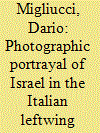

|
|
|
|
|
| Summary/Abstract |
This article analyzes a set of images of the Arab-Israeli conflict, published in 1947–67 by the Italian newspapers Unità (the communist party) and Avanti! (the socialist party), in an attempt to deconstruct the messages hidden behind these photographs and challenge the dichotomies on which the visual narrations of these periodicals were based. The general thesis is that these photographs were not meant to portray the actual reality of the conflict but rather to further political interests that had little to do with it.
|
|
|
|
|
|
|
|
|
|
|
|
|
|
|
|
| 9 |
ID:
168263
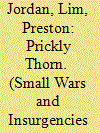

|
|
|
|
|
| Summary/Abstract |
Orde Wingate’s Special Night Squads played a key role in defeating the Great Arab Revolt of 1936–1939. Wingate’s Night Squads were distinctive in their approach to counter-insurgency warfare; in addition to bringing Arab insurgents to battle, the Night Squads proved their mettle by ‘flying the flag’ and by improving cooperation between Jewish settlers and British servicemen. Nevertheless, the Night Squad’s accomplishments and legacy must be properly situated within the broader wave of tactical innovations undertaken by the British Army throughout the Rebellion.
|
|
|
|
|
|
|
|
|
|
|
|
|
|
|
|
| 10 |
ID:
145505


|
|
|
|
|
| Summary/Abstract |
Shortly before and after the USSR’s demise, a new literature emerged: memoirs by veterans of the Soviet Union’s massive military intervention in the Arab-Israeli conflict in the 1960s and ’70s. Resurgent Russian pride, coupled with condemnation of its corruption by Soviet crimes, permitted startling disclosures. Tools we developed to evaluate these sources found them remarkably reliable and necessitated a reassessment of existing historiography. The Putin administration marked a reversal. Russian nationalism now stressed continuity with the USSR’s great-power status. ‘Falsification of history against Russian interests’ was criminalized. Some veterans resorted to purported ‘fiction’, which if challenged could be disclaimed. But under even stricter scrutiny, these narratives generally proved to reflect the authors’ actual experience, providing significant pointers for further research.
|
|
|
|
|
|
|
|
|
|
|
|
|
|
|
|
| 11 |
ID:
153090
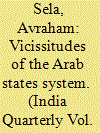

|
|
|
|
|
| Summary/Abstract |
This article analyzes the historical performance of the Arab states system—incarnated in the form of the League of Arab States (AL)—from the latter’s foundation in 1945 through its heydays in the late 1970s during which it left a long-term imprint in the form of new norms and rules governing the inter-Arab game, to the more recent state of weakness and marginalization, especially in the wake of the Arab Spring. Contrary to the commonly held views by Western scholars of the AL as an inherent failure, this article sheds light on the impact made by this system via the AL, especially in affecting interstate security and order in a region saturated with conflicts.
|
|
|
|
|
|
|
|
|
|
|
|
|
|
|
|
| 12 |
ID:
170594
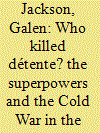

|
|
|
|
|
| Summary/Abstract |
Standard explanations for the demise of U.S.-Soviet détente during the 1970s emphasize the Soviet Union's inability to put aside its communist ideology for the sake of a more cooperative relationship with the United States. Soviet resistance to reaching a stable accommodation during this period, many analysts maintain, was especially evident in the Middle East, where Moscow is said to have embraced the “radical Arab program” vis-à-vis Israel. Such accounts do not fare well, however, in light of the historical evidence. Instead, that evidence indicates that the Soviet Union was eager to cooperate with the United States to achieve an Arab-Israeli agreement. The Richard Nixon and Gerald Ford administrations, however, were not interested in working with the Soviets in the Middle East, and instead sought to expel them from the region. These findings have important implications for scholarly debates about whether great power rivals can cooperate on issues where their strategic interests are overlapping, as well as for contemporary debates over U.S. policy toward countries such as China, Iran, North Korea, and Russia.
|
|
|
|
|
|
|
|
|
|
|
|
|
|
|
|
| 13 |
ID:
170738
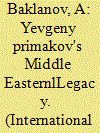

|
|
|
|
|
|
|
|